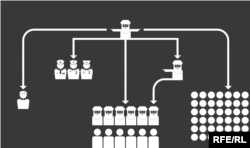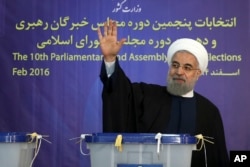Iranian hard-liners have been dealt an electoral setback, with moderates winning a majority in the country's top clerical body, the Assembly of Experts, and parliament.
Two leading conservatives, Ayatollahs Mohammad Yazdi and Mohammad Taghi Mesbah-Yazdi, were defeated in their bid for re-election to the important 88-member Assembly.
The body will pick the country's next supreme leader, to succeed the 76-year-old incumbent, Ayatollah Ali Khamenei, Iran's leader since 1989
State television reported Monday that moderate President Hassan Rouhani and his allies won 15 out of Tehran's 16 seats in the election for the Assembly, where members serve eight-year terms. Overall, the moderates will hold a 59 percent majority.
The Iranian Interior Ministry said that reformers, who favor social freedoms and engagement with the West, won at least 85 seats in parliament, while moderate conservatives, who also favor Iran's nuclear agreement with six world powers, won 73, giving the two groups a majority in the 290-seat parliament.
INFOGRAPHIC: This Is How Iran Is Ruled (click here)
Interior Minister Abdel Reda Rahmani Fazli says 62 percent of Iranians across the country and 50 percent in the capital, Tehran, participated. He added that candidates would have several days to appeal the election results.
Hardliners, who opposed the deal halting Iran's development of nuclear weaponry in exchange for lifting sanctions that had hobbled the country's economy, won 68 seats in parliament, down from the more than 100 in the current parliament.
Rouhani said Friday's election has given the government more credibility and clout.
"The competition is over. It's time to open a new chapter in Iran's economic development based on domestic abilities and international opportunities," the official IRNA news agency quoted him as saying.
Rouhani made last year's nuclear agreement with a group of six world powers, including the United States, a key objective of his administration and the electoral outcome could be interpreted as support for his policies.
Khamenei called on those elected to act in the interests of Iran and stand against the influence of other countries.
The state-run IRNA news agency quoted the leader saying development is the country's top goal.
"Nominal development without independence or national dignity is not accepted," Khamenei said.
Former Iranian president Abolhassan Bani Sadr tells VOA the election was a clear victory for Supreme Leader Ayatollah Khamenei, despite reports that “moderates” won more seats.
Former Iranian diplomat Mehrdad Khonsari argues the outcome of the election was at the very least an opportunity for the Iranian public to express its dissatisfaction with the hardliners.
"There is a feel-good factor for the population in the sense that the general outcome is one that satisfies public opinion because it sees stark improvement in the situation of moderates and because it gave the public an opportunity to express dissatisfaction with the hardliners, even though they are aware that in actual policy terms that might not make a difference," said Khonsari.
Iranian-born analyst Alex Vatanka tells VOA many Iranians decided to vote after being persuaded it would be foolish not to do so.
“There was more enthusiasm than many had actually anticipated only a few weeks ago, and that goes to the fact that [former president] Mohamed Khatami and others really put in a lot of effort to bring out the vote with a very simple message, which is, "'We know these elections are not free and fair, but even within the limited confines of this election, voting for moderates who are allowed to run will prevent the hardliners from getting a total grip on the system,'" said Vatanka.
Former deputy U.S. State Department spokesman, Adam Ereli, told VOA that despite the electoral changes in Iran, "I don't think that we're going to see a huge change in Iranian behavior, either internally or externally. It's like saying the far-right wing of the party didn't win, but that still means that the center of the party, which is very, very conservative, is in power."
Edward Yeranian contributed to this report from Cairo.







